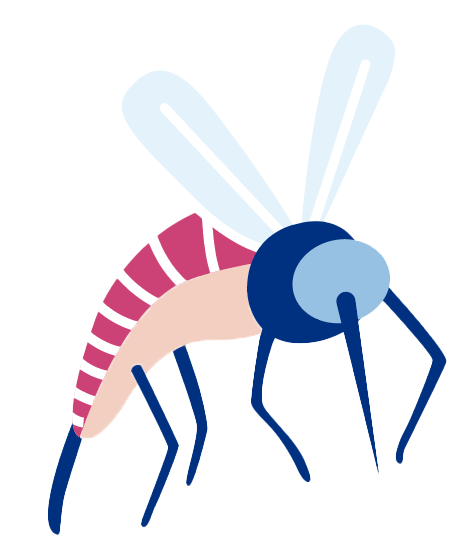Malaria
Malaria is a parasitic disease transmitted by a mosquito infected with plasmodium and known as the female anopheles.
This disease can be fatal if untreated.
It can have extremely serious, or even fatal, effects for young children and pregnant women.

Symptoms
- Mainly fever which starts between 8 and 30 days after infection.
- But also other symptoms such as:_
- Chills
- Headaches
- Muscle pain
- General fatigue
- Vomiting
- Diarrhoea
- Jaundice (yellowing of the skin and eyes)
- Pallor indicating anaemia (a serious disorder which specifically affects the blood)
Modes of transmission
- The disease is transmitted by mosquitoes. There is no direct transmission between people.
- However, an infected pregnant woman can transmit the disease to her unborn child.
- The rainy season is the most favourable time for disease transmission.
Disease progression
There are two forms of malaria:
Uncomplicated malaria
- This is the most common form. It can be treated with anti-malarial tablets provided by the health centre.
- Recovery is fairly quick, provided that the course of medication is taken consistently and for a sufficiently long time.
- However, uncomplicated malaria can develop into a form of severe malaria without appropriate treatment.
Severe malaria
- In addition to the symptoms described above, the disease can cause convulsions (involuntary contractions of part or all of the body’s muscles), or even coma (a state of deep unconsciousness) and rapidly result in death.
- Treatment must be provided urgently by healthcare workers.
Preventive measures
Due to the effects of malaria, preventative treatment is recommended for pregnant women, as well as for children under five, at the instigation of healthcare workers.
Some recommended precautions
- Disinfect the area surrounding homes (no stagnant water).
- Use an impregnated mosquito net or protective screens on windows at home to prevent mosquitoes from entering the room. The use of insecticides is recommended provided that they are regularly applied.
- When going out at night, wear clothing that covers the whole body.
![]() According to WHO's (World Health Organisation) estimates, malaria causes the death of a child every 30 seconds. It is the leading cause of death in children under five.
According to WHO's (World Health Organisation) estimates, malaria causes the death of a child every 30 seconds. It is the leading cause of death in children under five.
Find out more
Malaria is transmitted to humans by the bite of an infected female mosquito (Anopheles). It injects the parasite into humans by taking the blood required to lay its eggs. Males do not transmit malaria, because they do not bite.